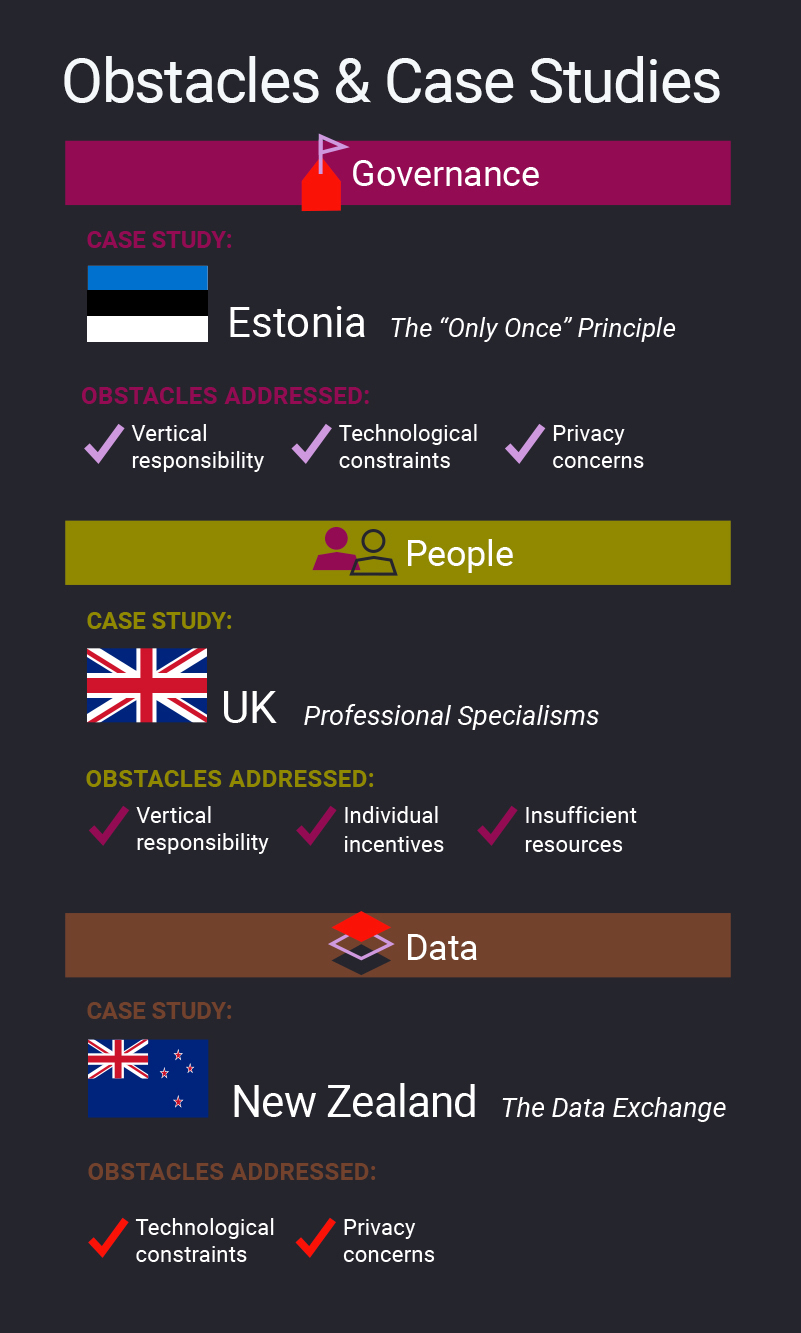December 11, 2018
The big and increasingly complex problems faced by governments around the world do not fit neatly into the internal structures by which governments have divided and organized themselves. As a result, many governments are struggling to respond effectively.
What are the obstacles to horizontal collaboration in government and how can they be overcome? We answer this question by examining three successful case studies through the lens of an analytical framework focused on three foundational organizational dimensions: governance, people, and data.
Here is what we learnt:
The Obstacles
The Obstacles
Governance
- Vertical responsibility
Public servants’ responsibilities and accountabilities tend to be organized on the basis of narrow vertical silos. - Individual incentives
Professional incentive structures often under-recognize, fail to reward, or otherwise poorly align with, working horizontally.
People
- Insufficient resources
Attempts at horizontality require intangible prerequisites like trust- and team-building but often underestimate the time and resources required to put these prerequisites into place. - 21st century skills
Governments can have difficulty retaining workers and managers with the flexibility, creativity, and ability to communicate and collaborate within and between teams, that working horizontally requires. - Champions needed
Horizontality requires champions able to clear away institutional obstacles but too often leaders are incentivized to focus on the reasons why a solution won’t work.
Data
- Privacy concerns
Real or perceived concerns around privacy, and restrictive data-use requirements, often block the data-sharing necessary for horizontal solutions. - Technological constraints
Incompatible data standards/formats and legacy systems that are not interoperable make it difficult to collaborate across institutional boundaries.
The Case Studies
The Case Studies

Estonia
The Once Only Principle
Legal prohibition preventing government bodies from asking Estonian citizens and businesses for information they have already provided to other parts of the government.

UK
Professional Specialisms
Formalized professional networks bringing together specialists (e.g., legal professionals) from across government and providing professional development, mentoring, networking, professional standards, etc.

New Zealand
The Data Exchange
Digital infrastructure for sharing data for research and program design purposes between departments as well as between government and NGOs contracted to provide social services.
Obstacles Addressed
Obstacles Addressed

Estonia
The Once Only Principle
- Vertical responsibility
- Technological constraints
- Privacy concerns

UK
Professional Specialisms
- Vertical responsibility
- Individual incentives
- Insufficient resources

New Zealand
The Data Exchange
- Technological constraints
- Privacy concerns
Lessons Learned
Lessons Learned

Estonia
The Once Only Principle
A small, focused legal change can spark a re-orientation of departmental priorities in ways that better align them with whole-of-government ones – at least when other critical pieces of foundational infrastructure are also in place.

UK
Professional Specialisms
Professional networks can foster horizontal perspectives that can improve organizations’ decision-making and operations.

New Zealand
The Data Exchange
Incrementally expanding data-sharing can better enable the design of a “person centred, integrated approach” to providing wrap-around care for the most vulnerable members of society through the collaborative construction of more holistic perspectives.
Practical Benefits
Practical Benefits

Estonia
The Once Only Principle
- Helps save the Estonian government costs equivalent to around two per cent of their GDP every year.
- Enabled a system that is extremely efficient in the information it holds and thus much more secure against inadvertent data leaks, cyber-attacks and hacks.

UK
Professional Specialisms
- Increased the competence of the civil service in certain key areas.
- Made it significantly easier to recruit individuals with desirable and in-demand professional skills into the public service.

New Zealand
The Data Exchange
- Provided new and impactful data-driven insights to departments and service providers that are helping improve the quality of human services across government.
- Provided health care insurers with access to an improved and more holistic view of health care across the entire country through a single data channel, thereby enabling them to build better actuarial models.
Success Factors
Success Factors

Estonia
The Once Only Principle
- Patience and consistent cross-partisan commitment through many years and across multiple changes in government has been critical to enabling the gradual, step-by-step development and implementation of the system.
- High levels of transparency around the system’s challenges, especially when things have gone wrong, have fostered citizens’ understanding of the system, as well as popular acceptance and trust.

UK
Professional Specialisms
- Strong leadership from the centre of government in the form of a full-time head of specialism supported by a dedicated team with stable core funding has been essential to success.
- The ability to recruit specialist talent competitively, quickly and flexibly, and to redeploy it across government to meet evolving needs has been critical to the initiative.

New Zealand
The Data Exchange
- Political leadership has created a robust demand for data and analysis by demanding that officials support their recommendations with the sort of evidence that the Data Exchange can provide.
- A focus on building a modest tool that can connect to other existing tools and scale incrementally, rather than a grand project to replace all existing tools, has made the project cheaper, less risky, more nimble and, ultimately, more resilient and impactful.
The Bottom Line
Clearly, the tools and models needed to succeed horizontally are available. Forward-looking governments have already begun using these tools to transform themselves into more horizontal entities. This will make it easier to take the additional steps needed to continue in this direction and successfully respond to today’s major policy challenges.
Those governments that have not moved as far along this path, however, should take heed and ensure that they, and their citizens, do not get left behind.








